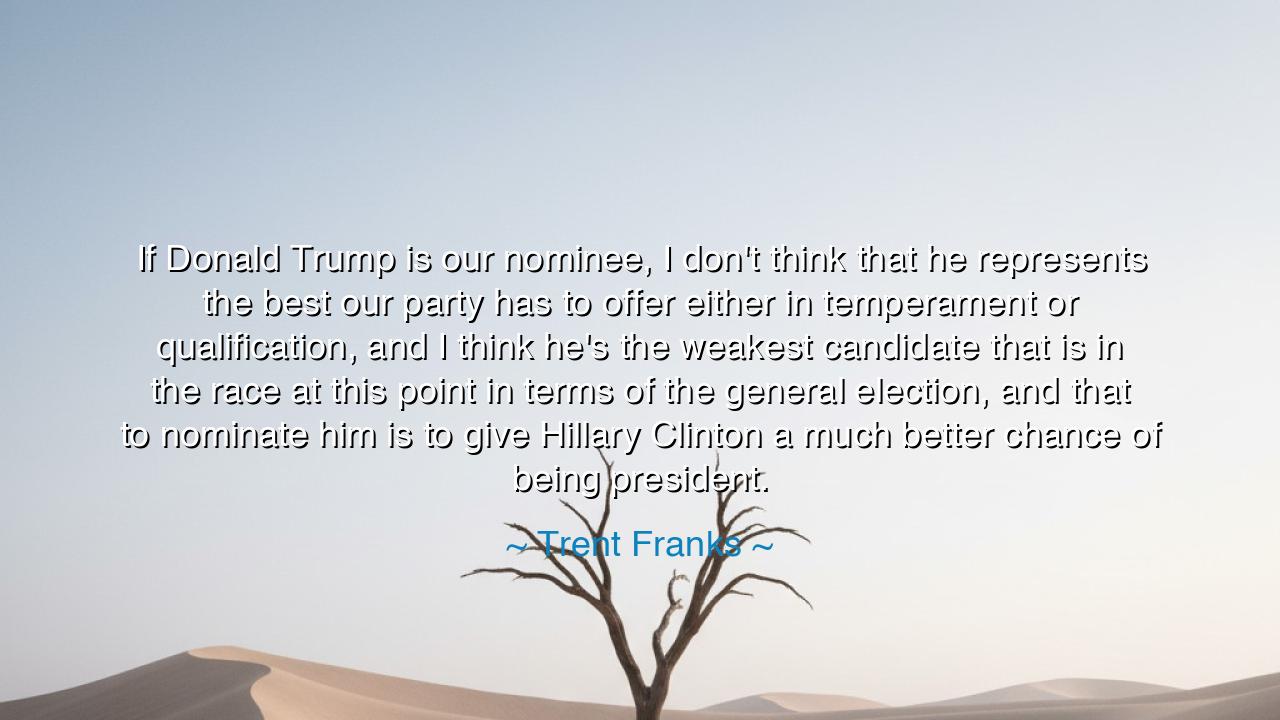
If Donald Trump is our nominee, I don't think that he represents
If Donald Trump is our nominee, I don't think that he represents the best our party has to offer either in temperament or qualification, and I think he's the weakest candidate that is in the race at this point in terms of the general election, and that to nominate him is to give Hillary Clinton a much better chance of being president.






In the words of Trent Franks, “If Donald Trump is our nominee, I don't think that he represents the best our party has to offer either in temperament or qualification, and I think he's the weakest candidate that is in the race at this point in terms of the general election, and that to nominate him is to give Hillary Clinton a much better chance of being president,” we are reminded of the importance of leadership, character, and strategy in the pursuit of political success. Franks, a figure of political wisdom, raises a warning—a cautionary call to his party that the right leader, one who embodies the highest qualities of leadership, is essential for winning the hearts and minds of the nation. His words speak not only to a moment in history, but to a timeless truth: leadership is not simply about winning a nomination, but about ensuring that the best person, both in temperament and qualification, is chosen to guide the people.
Franks’ declaration that Donald Trump does not represent the best the party has to offer invites a reflection on the qualities that make for great leadership. A leader must not only possess charisma or the ability to rally people but must also be a person of calm judgment, intellectual depth, and emotional maturity. In this light, Franks’ words are not simply about Trump, but about the ideal of leadership that transcends individuals. He cautions that to nominate a candidate whose character or qualifications are lacking is to risk the very fabric of the nation’s future. It is a call to ensure that the right person, with the necessary qualities, is chosen to represent the party, not just for the sake of victory, but for the integrity of the nation itself.
In times of great historical decision, leaders have always had to weigh their options carefully, for the stakes are often nothing less than the fate of their people. Consider the words of Abraham Lincoln, who faced a divided nation during the Civil War. He was not merely concerned with winning battles; he sought to heal a broken nation, and in doing so, he embodied the qualities of a leader who sought unity, wisdom, and strength. Lincoln’s temperament and qualification were undeniable. He understood that the presidency was not a prize to be won but a sacred duty to be fulfilled. Just as Lincoln knew the importance of choosing the right leaders in times of great turmoil, so too must modern politicians understand the weight of their choices when selecting a candidate to lead the nation.
Franks also suggests that Trump is the weakest candidate in the race—not simply for his party, but for the country at large. This speaks to the strategy of elections, where the ability to win is not just about rallying the faithful, but about appealing to a broader, more diverse electorate. Elections are not simply battles between two parties, but battles for the hearts and minds of the people. A strong candidate must be able to cross ideological lines and unite people under a common vision for the future. Just as Alexander the Great understood the need for strategic alliances and broad-based support in his conquests, so too must modern politicians understand the importance of appealing to the middle ground while still holding true to their values. The lesson here is clear: a successful leader is one who can navigate the complexities of national sentiment and build bridges, not walls.
Franks also warns that to nominate Trump, as the Republican candidate, is to hand the election to Hillary Clinton. This is a reminder of the real-world consequences of political decisions, that every choice made in the realm of politics can have profound and far-reaching consequences. Much like the decisions of kings in ancient times, every political choice has the potential to alter the course of history. Just as Caesar’s crossing of the Rubicon forever changed the fate of Rome, so too can a poorly chosen candidate change the direction of a nation’s future. Franks’ warning serves as a reminder that political decisions are not made in a vacuum, but in the context of the larger global landscape and the people’s needs.
But beyond the specifics of Trump and Clinton, Franks’ words contain a deeper lesson about leadership itself. Leadership, in any realm, requires more than just ambition or the will to win—it requires the wisdom to choose wisely, the character to withstand adversity, and the humility to accept responsibility for the consequences of one’s actions. Whether one is leading a nation, a business, or a community, the principles of good leadership remain constant. As we make decisions in our own lives, whether personal or professional, we must remember that leadership is about service, and that true leaders guide others with a clear sense of purpose, integrity, and vision.
Thus, the lesson of Trent Franks’ words is this: choosing the right leader is not just about who is the most popular or who can galvanize the base, but who possesses the temperament, the vision, and the strategic insight to lead a nation forward. In our own lives, we must seek to embody these qualities, to lead with purpose and responsibility, and to ensure that the choices we make today will shape a better tomorrow for those who follow. As we select leaders, let us choose not out of convenience, but out of a deep understanding of what the future requires.






AAdministratorAdministrator
Welcome, honored guests. Please leave a comment, we will respond soon